Thirumoozhikkulam Lakshmana Perumal Temple
Thirumoozhikulam Sree Lakshmanaperumal Temple is located in Thirumoozhikalam (Moozhikkulam) in Ernakulam district of Kerala. The temple finds mention in some of verses of ancient Tamil Vedam (Naalaayira Divyaprabhandham) sung by ShriVaishnava Alwars, particularly Nammalvar and Thirumangai Azhwar. It is one of the 108 holy Divya Desams.[1][2] venerated by Sri Vaishnavas. This belongs to one of the 13 Malai Naatu (Kerala/Chera) Divya Desams
| Thirumoozhikulam Sree Lakshmanaperumal Temple | |
|---|---|
Thirumoozhikkulam Lakshmana Perumaal Temple | |
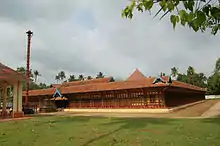 | |
| Religion | |
| Affiliation | Hinduism |
| District | Ernakulam |
| Deity |
|
| Features |
|
| Location | |
| Location | Thirumoozhikkulam (Near Aluva) |
| State | Kerala |
| Country | India |
 Shown within Kerala | |
| Geographic coordinates | 10°11′16″N 76°19′40″E |
| Architecture | |
| Type | Dravidian architecture (Kerala style) |
| Direction of façade | Standing (Nindra thirukolam) Facing East(Kizhake thirumuga mandalam) |
Legend
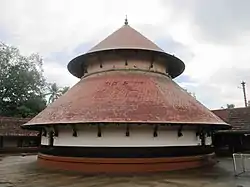
This shrine is associated with legends from the Ramayana. Bharata, the brother of Rama and Lakshmana, came to invite Rama, then in exile, to take over the reins of the kingdom, an angry Lakshmana suspecting Bharata's intentions intended to kill him; however, Bharata's innocence was very soon revealed, and then the two of them offered worship together at Tirumoozhikkalam. The name Tirumoozhikalam is said to have originated from the phrase "tiru-mozhi-kalam", on translation means, the site where sweet words were uttered.[3]
Another belief is that at the end of the Dvapara Yuga, Dvaraka was swallowed by the sea and four idols of Sreerama, Bharatha, Lakshmana and Shathrughna which Lord Sree Krishna worshipped, were also washed into the sea. Some fishermen subsequently caught these four idols near Thriprayar and they were given to Vakkay Kaimal Naduvazhi. Vakkay Kaimal, had a dream one night in which some mysterious person appeared before him and told him that four idols have been washed ashore and that these idols are to be consecrated at such and such places. They were duly installed in four temples as directed in the dream; Rama at Thriprayar, Bharata at Irinjalakuda, Lakshmana at Moozhikkulam and Shathrughna at Payammal. It is believed that worship at all these four temples on the same day is especially meritorious. In the Malayalam month of Karkidakam (15 July to 15 August) - the Ramayana Masam, thousands of devotees do this special pilgrimge, which is popularly known as "Nalambalam Yatra" - a pilgrimage to the four temples (Nalambalam).
As per another legend, Sage Harita was performing penance at this place. Vishnu was pleased by his devotion and appeared to him. The sage requested Vishnu to provide the way in which all men can proceed to Varnashrama Dharma, Vishnu uttered the sacred words, after which the place came to be known as Thirumoozhikalam.[3]
History
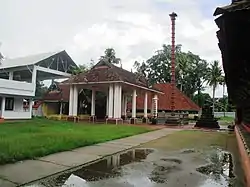
The mythology behind the name of this place originates from the story of Hareetha Maharishi who did penance and meditation on the banks of river Poorna (Chalakudy River). Lord Mahavishnu impressed by the dedication of the Maharishi and appeared before him at the beginning of Kali Yuga. Lord Vishnu gave some advice to Hareetha Maharshi to overcome the difficulties in Kali Yuga and these pieces of advice are called "Thiru Mozhi" meaning 'Sacred Words'. Thereafter, this place was named as "Thirumozhi kalam" – kalam means place. Later Thirumozhikkalam became Thirumoozhikkulam.
Architecture
The temple complex enclosed in a large area with picturesque surroundings, holds the main sanctum dedicated to Lakshmana Perumal. The sanctum sanctorum of the main shrine houses the idol of Mahavishnu. The main annual festival for ten days each year in the month of Medam (April/May). The temple is under the administration of the Travancore Devaswom Board.
Azhwar Paasuram
தகவன்று என்று உரையீர்கள் தடம் புனல் வாயிரை தேர்ந்து
மிகவின்பம் படமேவும் மென்னடைய வன்னங்காள்
மிகமேனி மெலிவெய்தி மேகலையும் ஈடழிந்து என்
அகமேனி யொழியாமே திரு மூழிக் களத்தார்க்கே 9-7-10 ThiruvaaiMozhi (NamAzhwar)
Slow moving Swans, who search of happy meal in wide water sources, I have thinned in his (Thirumoozhikalam Lord) thought that my clothes no more fit me and fall down while the soul still dwells in body. Tell my lord of Thirumoozhikalam that it is not fair to desert me without moksha.
பொன்னானாய் பொழிலேழும் காவல் பூண்ட புகழானாய் இகழ்வாய தொண்ட னேன்நான்,
என்னானாய்? என்னானாய்? என்னல் அல்லால் என்னறிவ னேழையேன், உலக மேத்தும்
தென்னானாய் வடவானாய் குடபா லானாய் குணபால மத யானாய் இமையோர்க் கென்றும்
முன்னானாய் பின்னானார் வணங்கும் சோதி திருமூழிக் களத்தானாய் முதலா னாயே 2061 - Thirunedunthaandagam (Thirumangai Azhwar)
O First Lord! O Golden Lord, sentinel of the seven worlds! Other than exclaiming, "What happened to you? Where are you?", this despicable lowly devotee-self knows nothing. O Lord of the South, Lord of the North, Lord of East and west! O Rutted elephant! O First Lord of the celestials! You are the radiant Lord of Tirumoozhikalam, where later generations will worship you forever.
Location and transport
The temple is located about 25 km from Ernakulam. The nearest railway stations are Aluva and Angamaly; the nearest airports are Cochin International Airport, and Nedumbassery Airport. The temple is in fact located less than 12 km from Nedumbassery airport. For travelling pilgrims, it is recommended that they stay at Angamaly or Nedumbassery and commute to the temple for Perumal Darshan, as the place has limited facilities for stay.
Gallery
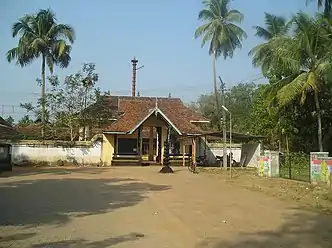 Kapila Theertham (Temple tank)
Kapila Theertham (Temple tank)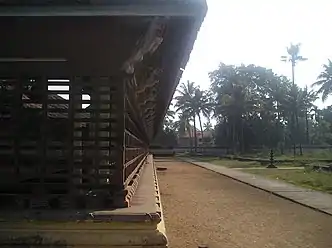 Chuttambalam South side view
Chuttambalam South side view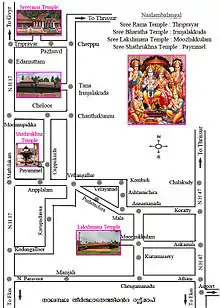 Route Map of Nalambalam Yathra
Route Map of Nalambalam Yathra
References
| Wikimedia Commons has media related to Thirumoozhikulam Temple. |
- "Nammalvar : Poems and Biography". Poetry-chaikhana.com. Archived from the original on 10 August 2011. Retrieved 4 July 2011.
- Elayavalli, Venkatesh K. "108 Divya Desam: A Virtual Tour". Archived from the original on 19 July 2011.
- R., Dr. Vijayalakshmy (2001). An introduction to religion and Philosophy - Tévarám and Tivviyappirapantam (1st ed.). Chennai: International Institute of Tamil Studies. pp. 536–7.